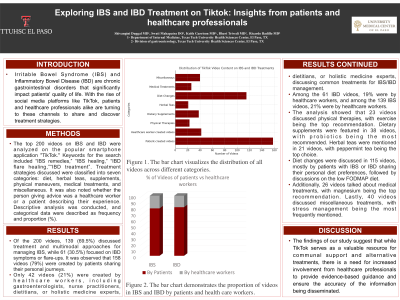Monday Poster Session
Category: Functional Bowel Disease
P2359 - Exploring IBS and IBD Treatment Trends on TikTok: Insights From Patients and Healthcare Professionals
Monday, October 28, 2024
10:30 AM - 4:00 PM ET
Location: Exhibit Hall E

Has Audio

Shivangini Duggal, MD
TTUHSC
El Paso, TX
Presenting Author(s)
Shivangini Duggal, MD1, Swati Mahapatra, DO2, Keith Garrison, MD2, Bhavi Trivedi, MD2, Ricardo Badillo, MD1
1TTUHSC, El Paso, TX; 2Texas Tech University Health Sciences Center, El Paso, TX
Introduction: Irritable Bowel Syndrome (IBS) and Inflammatory Bowel Disease (IBD) are chronic gastrointestinal disorders that significantly impact patients' quality of life. With the rise of social media platforms like TikTok, patients and healthcare professionals alike are turning to these channels to share and discover treatment strategies.
Methods: The top 200 videos on IBS and IBD were analyzed on the popular smartphone application "TikTok." Keywords for the search included “IBS remedies,” “IBS healing,” “IBD flare healing,”“IBD treatment”. Treatment strategies discussed were classified into seven categories: diet, herbal teas, supplements, physical maneuvers, medical treatments, and miscellaneous. It was also noted whether the person giving advice was a healthcare worker or a patient describing their experience. Descriptive analysis was conducted, and categorical data were described as frequency and proportion (%).
Results: Of the 200 videos, 139 (69.5%) discussed treatment and multimodal approaches for managing IBS, while 61 (30.5%) focused on IBD symptoms or flare-ups. It was observed that 158 videos (79%) were created by patients sharing their personal journeys. Only 42 videos (21%) were created by healthcare workers, including gastroenterologists, nurse practitioners, dietitians, or holistic medicine experts, discussing common treatments for IBS/IBD management. Among the 61 IBD videos, 19% were by healthcare workers, and among the 139 IBS videos, 21% were by healthcare workers. The analysis showed that 23 videos discussed physical therapies, with exercise being the top recommendation. Dietary supplements were featured in 38 videos, with probiotics being the most recommended. Herbal teas were mentioned in 21 videos, with peppermint tea being the top choice. Diet changes were discussed in 115 videos, mostly by patients with IBS or IBD sharing their personal diet preferences, followed by discussions on the low FODMAP diet. Additionally, 26 videos talked about medical treatments, with magnesium being the top recommendation. Lastly, 40 videos discussed miscellaneous treatments, with stress management being the most frequently mentioned.
Discussion: The findings of our study suggest that while TikTok serves as a valuable resource for communal support and alternative treatments, there is a need for increased involvement from healthcare professionals to provide evidence-based guidance and ensure the accuracy of the information being disseminated.
Disclosures:
Shivangini Duggal, MD1, Swati Mahapatra, DO2, Keith Garrison, MD2, Bhavi Trivedi, MD2, Ricardo Badillo, MD1. P2359 - Exploring IBS and IBD Treatment Trends on TikTok: Insights From Patients and Healthcare Professionals, ACG 2024 Annual Scientific Meeting Abstracts. Philadelphia, PA: American College of Gastroenterology.
1TTUHSC, El Paso, TX; 2Texas Tech University Health Sciences Center, El Paso, TX
Introduction: Irritable Bowel Syndrome (IBS) and Inflammatory Bowel Disease (IBD) are chronic gastrointestinal disorders that significantly impact patients' quality of life. With the rise of social media platforms like TikTok, patients and healthcare professionals alike are turning to these channels to share and discover treatment strategies.
Methods: The top 200 videos on IBS and IBD were analyzed on the popular smartphone application "TikTok." Keywords for the search included “IBS remedies,” “IBS healing,” “IBD flare healing,”“IBD treatment”. Treatment strategies discussed were classified into seven categories: diet, herbal teas, supplements, physical maneuvers, medical treatments, and miscellaneous. It was also noted whether the person giving advice was a healthcare worker or a patient describing their experience. Descriptive analysis was conducted, and categorical data were described as frequency and proportion (%).
Results: Of the 200 videos, 139 (69.5%) discussed treatment and multimodal approaches for managing IBS, while 61 (30.5%) focused on IBD symptoms or flare-ups. It was observed that 158 videos (79%) were created by patients sharing their personal journeys. Only 42 videos (21%) were created by healthcare workers, including gastroenterologists, nurse practitioners, dietitians, or holistic medicine experts, discussing common treatments for IBS/IBD management. Among the 61 IBD videos, 19% were by healthcare workers, and among the 139 IBS videos, 21% were by healthcare workers. The analysis showed that 23 videos discussed physical therapies, with exercise being the top recommendation. Dietary supplements were featured in 38 videos, with probiotics being the most recommended. Herbal teas were mentioned in 21 videos, with peppermint tea being the top choice. Diet changes were discussed in 115 videos, mostly by patients with IBS or IBD sharing their personal diet preferences, followed by discussions on the low FODMAP diet. Additionally, 26 videos talked about medical treatments, with magnesium being the top recommendation. Lastly, 40 videos discussed miscellaneous treatments, with stress management being the most frequently mentioned.
Discussion: The findings of our study suggest that while TikTok serves as a valuable resource for communal support and alternative treatments, there is a need for increased involvement from healthcare professionals to provide evidence-based guidance and ensure the accuracy of the information being disseminated.
Disclosures:
Shivangini Duggal indicated no relevant financial relationships.
Swati Mahapatra indicated no relevant financial relationships.
Keith Garrison indicated no relevant financial relationships.
Bhavi Trivedi indicated no relevant financial relationships.
Ricardo Badillo indicated no relevant financial relationships.
Shivangini Duggal, MD1, Swati Mahapatra, DO2, Keith Garrison, MD2, Bhavi Trivedi, MD2, Ricardo Badillo, MD1. P2359 - Exploring IBS and IBD Treatment Trends on TikTok: Insights From Patients and Healthcare Professionals, ACG 2024 Annual Scientific Meeting Abstracts. Philadelphia, PA: American College of Gastroenterology.

